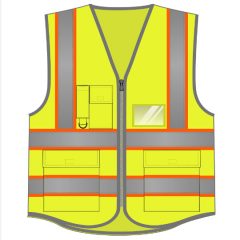Low unemployment favors companies manufacturing work clothes, shoes, and protective equipment. The roughly six billion markets for this product is growing gracefully with staff hunger and increased turnover. At the same time, employers are trying to control the costs of equipping employees. They recycle and purchase vending machines.
More people at work need more overalls, helmets, and boots. But this is not the main reason why their sales are growing, according to industry companies. “Some employers see this as a benefit for employees and buy better and safer work aids, shoes, clothes,” says Leonard Mynář of Canis Safety, the market leader in protective work equipment.
For example, nicer, colorful work boots are bought. An eye-catcher is clothing with reflective material elements. “But somewhere, workers still have just car reflective vests,” Mynar points out.
Employers give their people more comfort, for example by not leaving care for their work clothes, but by hiring an external company. Leasing of work clothes was on the rise when the owner of work clothes is owned by an external supplier who regularly picks up clothes, washes, and exchanges them for new ones when worn.
“We are leasing some equipment and protective equipment,” said Kateřina Pavlíková, a spokesman for Czech Airlines Handling, providing airlines with check-in at Prague Airport.
Ardon Safety, a toolkit three, is also considering this service. “It is more expensive, but the workwear is made-to-measure in this case, it does not restrict its user, it is regularly washed and the employer is sure that his people work in clean clothes and represent the company well,” says company executive Tomas Vozenílek.
However, staff pampering does not work everywhere. “When visiting the factory, the employee at the assembly desk complained that her poor shoes that fascinate her legs smell more than her men in the evening after the shift,” says Miroslav Rous, CEO of the Cerva Group, the domestic leader in protective gear. “I also found that employees handle hot plastic moldings while burning their hands,” adds another example of Rous.
There is a difference in what kind of work equipment the core employees receive and what agency workers are hired. They often change their work, so it does not make sense for the agencies that are obliged to equip them with aids. They buy only the basic equipment to meet the safety standard, comfort is not so much taken into consideration.
“On average, turnover has risen by around 10 percent, increasing the cost of work equipment. The agency and end employers are addressing this by looking for new suppliers with better prices, seeking volume discounts,” explains Alena Zahrádková, manager of Randstad’s branch in Ústí nad Labem.
“For shoes and gloves, the employer is trying to buy the cheapest product, so it favors importers from China rather than domestic manufacturers,” adds Jaroslav Palát, chairman of the board of shoemaking company Prabos Plus.
When people take turns, the cost of the gadgets comes in part. “We are trying to put pressure on employees to return the tools after the end of their employment under the threat of financial penalties, but non-transferable tools need to be depreciated and cost a lot of money,” says Jiri Halbrstat, recruitment and marketing manager at ManpowerGroup. This registers a one-fifth increase in turnover and a similar increase in staff equipment costs.
“If employees leave earlier than a year, they return our clothes. We then have them professionally cleaned, washed and provided free of charge to our employees as a replacement. We provide used shoes and clothing of no interest to charities,” Zahrádková explains. Some things like clothing or goggles can be reused. However, for example, shoes cannot be recycled for hygienic reasons.
Here he felt the opportunity of Prabos and recently began offering washable textile work boots. No one else thought of it yet, because washing shoes meant practically destroying them. “We have been on the market for four months so far, they sell well. As far as it is due to washability, I cannot say,” says Palát.
It is no longer possible, just on the card
Employers are also trying to put costs under control by introducing vending machines. With a personal chip card, only a limited number of devices are allowed to pick up each month.
“Previously there was a free-standing work gloves dispenser in operation, and everyone took what they needed. But sometimes, workers also took gloves at home to work in the garden,” Rous says. According to Mynář of Canis Safety, which sells and leases vending machines to companies and subsequently replenishes with goods, one costs 10,000 euros. “It will return to the company within a year, save on the warehouse worker, and aids are available 24 hours a day,” he says.
Vending machines are often used in the automotive sector and in indoor hall operations. “We use vending machines in all of our buildings, and employees can pick up safety equipment of the size they like – work gloves, reflective vests with reflective tapes, safety knives or water bottles,” says Ctibor Jappel, spokesman for the Czech Amazon division who runs a large warehouse in Dobrovíz near Prague.
For example, a person is entitled to gloves at every shift. “But if he overdraws, he can go to the master to raise his account,” adds Zahrádková.

